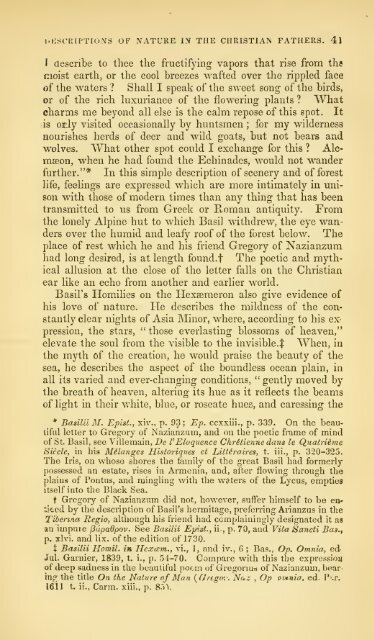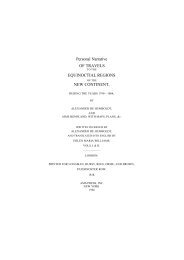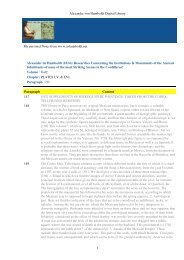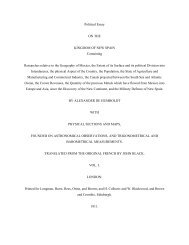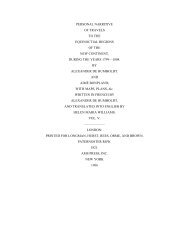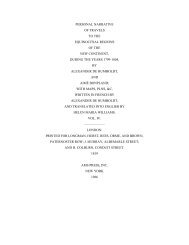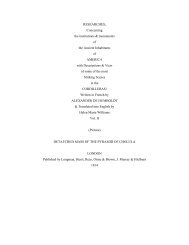See the complete document here
See the complete document here
See the complete document here
You also want an ePaper? Increase the reach of your titles
YUMPU automatically turns print PDFs into web optimized ePapers that Google loves.
I-KSCKIPTIONS OF NATURE IN THE CHRISTIAN FATHERS. 4l<br />
I describe to <strong>the</strong>e <strong>the</strong> fructifying vapors that rise from tha<br />
cioist earth, or <strong>the</strong> cool breezes wafted over <strong>the</strong> rippled face<br />
of <strong>the</strong> waters ? Shall I speak of <strong>the</strong> sweet song of <strong>the</strong> birds,<br />
or of <strong>the</strong> rich luxuriance of <strong>the</strong> flowering plants ? What<br />
charms me beyond all else is <strong>the</strong> calm repose of this spot. It<br />
is only visited occasionally by huntsmen ; for my wilderness<br />
nourishes herds of deer and wild goats, but not bears and<br />
wolves. What o<strong>the</strong>r spot could I exchange for this ? Alcmseon,<br />
when he had found <strong>the</strong> Echinades, w^ould not wander<br />
fur<strong>the</strong>r."* In this simple description of scenery and of forest<br />
Ufe, feelings are expressed which are more intimately in unison<br />
with those of modern times than any thing that has been<br />
transmitted to us from Greek or Roman antiquity. From<br />
<strong>the</strong> lonely Alpine hut to which Basil withdrew, <strong>the</strong> eye wanders<br />
over <strong>the</strong> humid and leafy roof of <strong>the</strong> forest below. The<br />
place of rest which he and his friend Gregory of Nazianzum<br />
had long desired, is at length found. f The poetic and mythical<br />
allusion at <strong>the</strong> close of <strong>the</strong> letter falls on <strong>the</strong> Christian<br />
ear like an echo from ano<strong>the</strong>r and earlier world.<br />
Basil's Homilies on <strong>the</strong> Hexsemeron also give evidence of<br />
his love of nature. He describes <strong>the</strong> mildness of <strong>the</strong> con-<br />
stantly clear nights of Asia Minor, w<strong>here</strong>, according to his eX'<br />
pression, <strong>the</strong> stars, " those everlasting blossoms of heaven,"<br />
elevate <strong>the</strong> soul from <strong>the</strong> visible to <strong>the</strong> invisible, $ When, in<br />
<strong>the</strong> myth of <strong>the</strong> creation, he would praise <strong>the</strong> beauty of <strong>the</strong><br />
sea, he describes <strong>the</strong> aspect of <strong>the</strong> boundless ocean plain, in<br />
all its varied and ever-changing conditions, " gently moved by<br />
<strong>the</strong> breath of heaven, altering its hue as it reflects <strong>the</strong> beams<br />
of light in <strong>the</strong>ir white, blue, or roseate hues, and caressing <strong>the</strong><br />
* Basilii M. Episi., x'w., p. 93 ; Ep. ccxxiii., p. 339. On <strong>the</strong> beautiful<br />
letter to Gz'egory of Nazianzum, and on <strong>the</strong> poetic frame of mind<br />
of St. Basil, see Villemain, De V Eloquence Chr^iienne dans le Q,uatneme<br />
Steele, in his Melanges Historiques et Litteraires, t. iii., p. 320-325.<br />
The Iris, on whose shores <strong>the</strong> lamily of <strong>the</strong> great Basil had formerly<br />
possessed an estate, rises in Armenia, and, after flowing through <strong>the</strong><br />
plains of Pontus, and minghng with <strong>the</strong> waters of <strong>the</strong> Lycus, empties<br />
itself into <strong>the</strong> Black Sea.<br />
t Gregory of Nazianzum did not, however, suffer himself to be enticed<br />
by <strong>the</strong> description of Basil's hermitage, preferring Arianzus in <strong>the</strong><br />
Tihenna Regio, although his friend had it ccmplainingly designated aa<br />
an impuie (3dpadpov. <strong>See</strong> Basilii Epist., ii-, p. 70, and Vila Sancti Baa.f<br />
p.<br />
xlvi. and lix. of <strong>the</strong> edition of 1730.<br />
X Basilii Homil. in Hexcem., vi., 1, and iv., 6 ; Bas., Op. Omnia, ed<br />
Jul. Garnier, 1839, t, i., p. 54-70. Compare with this <strong>the</strong> expressioij<br />
of deep sadness in <strong>the</strong> beautiful poem of Gregorm^ of Nazianzum, bear,<br />
ing <strong>the</strong> title On <strong>the</strong> Nature of Man {(J rcgo',: Nuz , Op otx-nia. ed. T''-r.<br />
1611 t. ii., Carra. xiii., p. 85\


